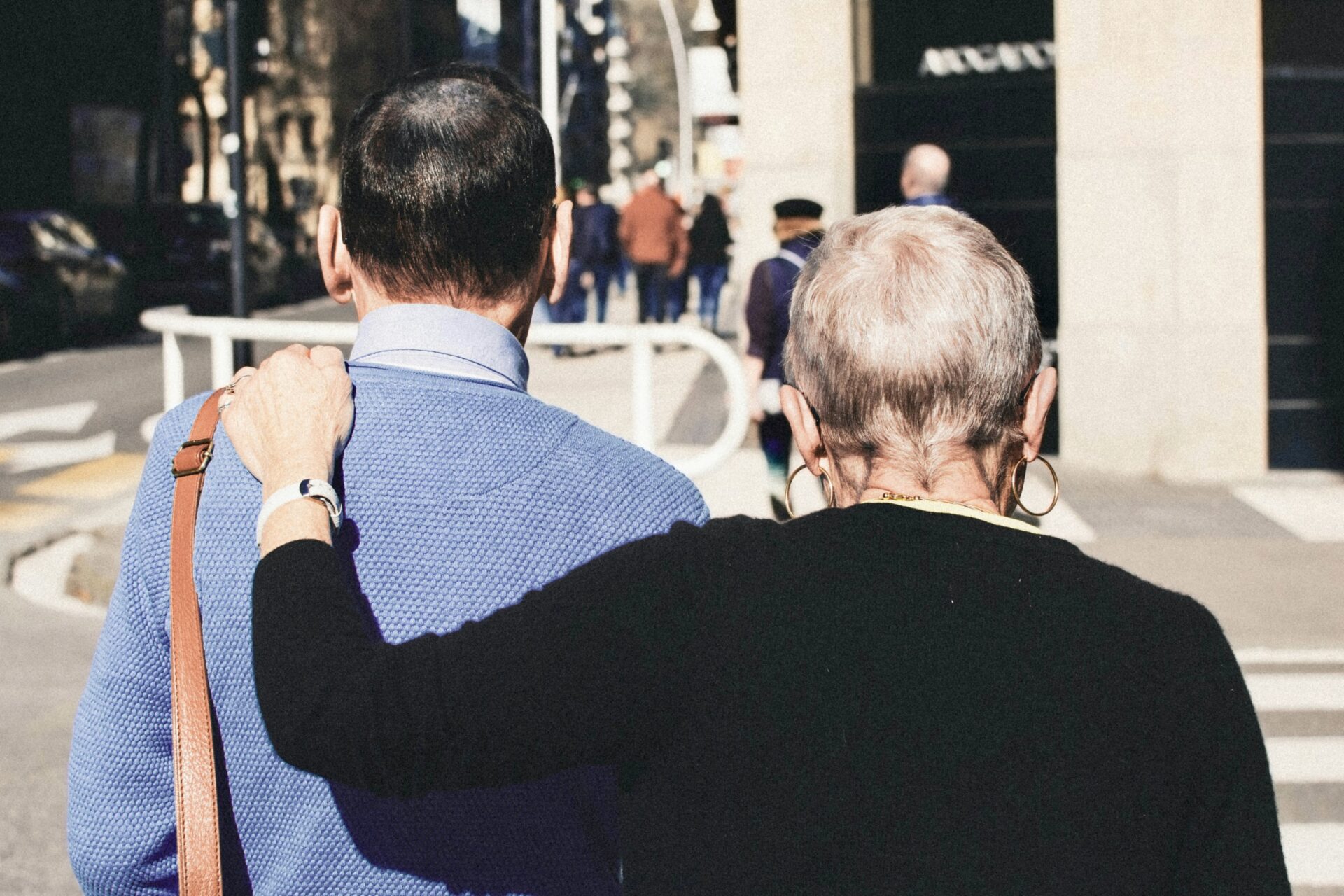
Two Together: Save £100!
Save £100 when you purchase two funeral plans together. Call us for more details.

Here for you this Easter
Our Funeral Plan team is available Friday & Monday, 10am–4pm. Call us for support.

Two Together: Save £100!
Save £100 when you purchase two funeral plans together. Call us for more details.

Here for you this Easter
Our Funeral Plan team is available Friday & Monday, 10am–4pm. Call us for support.

Article reviewed by Judy Carole, Published Author on March 17, 2025.
Talking about death isn’t easy for most, but it is a profound and meaningful conversation topic that we have the opportunity to discuss with the people we care most about. Whether you’re wondering how to start a conversation about death because you’re seeking to express your own wishes, support a loved one, or explore end-of-life planning and funeral options, opening up about death can bring clarity, and even a sense of peace.
Though the reason for your reading might mean you’re in a difficult spot in life at the moment, we hope this guide can provide some gentle, practical steps to help you approach these topics with empathy, sensitivity, and a little more comfort.
Key Takeaways
People have a variety of different reasons for wanting to start a conversation about death; from needing to make sure loved ones know about end-of-life wishes to announcing a death to friends, to addressing fears and uncertainties around mortality.
Death anxiety refers to the fear, worry, or unease related to the awareness of mortality. It can stem from concerns about going through the end-of-life stages and the process of dying; the unknowability of what happens after death; or the impact of one’s death on loved ones. While it is a natural part of human experience, excessive death anxiety can interfere with daily life and emotional well-being. Understanding and addressing these feelings can help people find peace and meaning in life.
Having conversations about death can break the silence that often surrounds it, potentially helping reduce the anxiety.
You may want to broach the topic of death in order to offer words of support to a friend who is dealing with the unexpected death of a loved one, or loved one who has either received a diagnosis, or has entered the latter years of their life. Oftentimes, people are afraid of saying the ‘wrong thing’ or upsetting someone, so they choose to remain quiet. While it’s a good idea to proceed with caution and sensitivity when opening up a conversation about death, many feel it’s a relief to be able to speak openly about their situation practically, emotionally, and even spiritually.
If you’ve taken out a funeral plan, made a will, or simply know what preferences you have regarding end-of-life and funeral arrangements, engaging in conversations about these topics with relevant parties becomes somewhat of a necessity. Talking about death and dying may initially feel daunting, but it can provide a sense of relief for friends and family by clearly outlining your end-of-life and funeral wishes. This ensures they have all the necessary information when the time comes, eliminating pressure and uncertainty from the decision-making process.
If you’re unsure about where to start, you can seek assistance from an end-of-life planning guide to help kick-start your exploration.
Death has long been seen as a taboo in society, where many have refrained from talking about it for fear of ‘tempting fate’, or indeed just finding it too difficult. It has long been a sensitive subject, often surrounded by cultural, societal, and personal barriers that discourage freeflowing discussion. Gatherings like Death Cafe’s have the intention of bringing conversations about death into the open by challenging the silence and stigma that perpetuate fear and misunderstanding around it.
Aura was founded by Paul Jameson and his son Dave (our CEO) specifically to help fight this taboo, after he was diagnosed with motor neurone disease. Paul’s journey with a terminal illness has helped him to understand the importance of talking about death with those close to him. Aura’s mission to help families with their end-of-life planning comes directly out of Paul’s own effort to put things in place for his own family.
Paul’s vision—and the mission of Aura—is to empower more people to challenge the taboo surrounding death. These conversations don’t have to be daunting or uncomfortable; instead, they can inspire us to acknowledge life’s fragility and embrace every moment with greater purpose and appreciation.

It might not seem like a conversation about death could have many upsides — after all, it’s a topic many of us shy away from. However, opening up about it can have surprising and meaningful benefits. By addressing our thoughts and feelings around it, we can not only confront our fears but also pave the way for mutual understanding and emotional connection.
Far from being morbid, these discussions can help us reflect on life, clarify our wishes, and even strengthen our relationships with those we love by encouraging us to have thoughtful and open conversations.
Having these conversations encourages us to be more open with those we love. Sharing thoughts and feelings about death requires a little vulnerability, creating a space for authentic and heartfelt conversations. This often deepens bonds and strengthens emotional connections.
Discussing end-of-life wishes, legacies, or experiences of grief allows us to understand each other’s values and priorities, promoting clarity and reducing misunderstandings. It can also have the side-effect of resolving unspoken issues in relationships.
Open discussions can prompt reconciliation and healing by addressing unresolved conflicts or unexpressed emotions, bringing a sense of closure and peace to relationships. Many times there have been misunderstandings simply due to a lack of communication, and can be sorted out quickly once open conversations are had.
Talking about death and organising benefits or memorials together can help families and friends unite to support one another in navigating loss, grief, or mortality. These discussions and acts often lead to empathy and a shared sense of resilience within a community.
These conversations often encourage reflections on life, gratitude, and shared moments. Talking about death alongside reminiscing over photographs or listening to a loved one’s favourite musical pieces can create positive and cherished shared memories. It can strengthen the appreciation for relationships and reinforce bonds through mutual reflection.
Talking about end-of-life topics can lead to the completion of more practical steps, such as creating a will, drafting advance directives, or exploring funeral plans. It can also help encourage legacy planning, or prompt you to think about how you want to share your life story.
Planning ahead can provide peace of mind and relieves loved ones of potentially difficult future decisions. Discussing death allows us to take charge of our legacy and ensure our wishes are well documented. A funeral that reflects our personal preferences not only provides a sense of resolution for us, but also aids loved ones in processing their grief by making the service a unique tribute to who we are.
While there are several reasons to consider planning your own funeral, many people opt for prepaid funeral plans to take charge of their end-of-life arrangements, ensuring their wishes are honoured and relieving potential pressures from loved ones when the time comes.
At Aura, we provide all-inclusive funeral plans for direct cremations, covering all essential services involved in your funeral. Our dedicated team of Aura Angels will be there for your family when the time comes to put the plan into action, and support them through the steps to arranging your funeral. They are there to help guide and comfort at any stage, and are experts in funeral arranging.
With 4.9/5 stars on Trustpilot, it’s easy to see how committed we are to providing compassionate care to those all across mainland Britain in need of support.
Now that we’ve discussed the potential benefits of and reasons for talking about death, let’s explore how to start. Whether you’re trying to figure out how to announce a death to friends, or begin a conversation about what to do when someone dies, these tips can be helpful in sensitively approaching the topic.
Timing matters when bringing up sensitive subjects. Look for calm, private settings where everyone can feel at ease. Casual moments, such as after a family meal or during a walk, can also provide opportunities to gently introduce the topic, as long as it feels appropriate.
You might look for natural opportunities, such as after watching a film or reading an article about end-of-life topics, when the subject feels relevant and less abrupt.
Try your best to assess whether you and the other person or people are emotionally prepared for a discussion of this nature. A clear-headed and composed state of mind is always best. If someone has recently experienced a loss, be sensitive to their grieving process and timing.
If possible, introduce the topic when it aligns with a specific need, such as making a will, comparing funeral plan options, planning a funeral, or discussing long-term care preferences. Practical contexts provide a natural segue and focus for the conversation.
It can help to ease into the discussion with general or hypothetical questions, such as, “Have you ever thought about how you’d want to be remembered?” or “Have you heard about some ancient myths and legends about death?”
Observe the other person’s comfort level and adjust the depth of the conversation accordingly. It’s important not to continue full steam ahead when the other person is obviously uncomfortable and not receptive.
Starting with questions like “What are your thoughts on end-of-life care?”, “Have you ever considered what you’d like your legacy to be?” or “Have you heard about direct cremations?” can invite thoughtful dialogue. These questions show that you’re curious and willing to listen without judgement.
Opening up about your own experiences or reflections can make the topic feel less intimidating. You might say, “I’ve been thinking about British funeral traditions” or “I want to make sure my family doesn’t have to guess about my wishes.”
Many people, understandably, hesitate to discuss death out of fear of upsetting others or confronting their own feelings about mortality. Lots of us aren’t really sure how to break bad news, or even bring up the loss of a loved one to a friend or colleague. This discomfort is natural, but with preparation, these conversations can feel less scary and more constructive, uniting us in the inevitable experience of dealing with death.
In some cultures and communities, death is not very openly talked about. Challenging these norms by framing death as an inevitable and natural part of life can help reduce the stigma over time. Throughout history, countless artists, writers, and poets have explored the question, ‘What is beautiful about death?’ This timeless and profound topic continues to inspire, with fresh perspectives and interpretations emerging even today.
Not everyone will feel ready to discuss death immediately. Even if you feel comfortable talking about it, give your loved ones time to process their feelings, and be open to revisiting the conversation when they’re prepared. Approaching it ‘little and often’ may be the most reasonable approach, even if it may feel too slow to you.
Sadness, discomfort, or even frustration are natural responses. Acknowledge these emotions and reassure those involved that it’s okay to feel this way.
Practising active listening involves fully focusing on, understanding, and responding to the speaker in a meaningful way. By being fully present (eliminating distractions like phones, background noise and wandering thoughts, making eye contact to show attentiveness) you can help the person you’re communicating with feel heard. Other points to consider:
When speaking with healthcare providers, it can be helpful to prepare questions in advance. Topics like palliative care, hospice options, and advance directives can ensure your wishes are understood and respected.
Talk openly about treatment preferences, quality of life, and end-of-life care goals. These discussions help clarify medical choices and align care with values.
Healthcare professionals are trained to address sensitive topics with compassion. Being honest and authentic with them builds trust and helps you access the support you need.
If you’re unsure where to start, tools like conversation starter kits or guides from organisations such as Dying Matters can help. Death Cafés and community workshops also provide spaces to explore these topics in a supportive environment.
Books, podcasts, and online resources can further normalise these discussions, offering inspiration and advice for creating open dialogue.
Talking about death is ultimately an act of love and care—for yourself and those around you. By starting these conversations with empathy and openness, you can build deeper connections and ensure your wishes are honoured, bringing comfort and clarity to the journey ahead.
Discussing our wishes for the end of life allows us to honour personal values, alleviate the emotional stresses on loved ones, and strengthen relationships through mutual understanding. If this article has brought up any questions or if you’d like assistance with arranging your own funeral plan, we’re here to help. Feel free to give us a call—we’re ready to assist you.



If you have any questions, would like a brochure or simply would like a chat through our services, our award-winning team is here to help.
Unlike other providers, we won’t hassle you with constant calls. We’ll simply ensure you have the information you need and leave you to come to a decision in your own time. When you’re ready for us, our team will be ready to help.